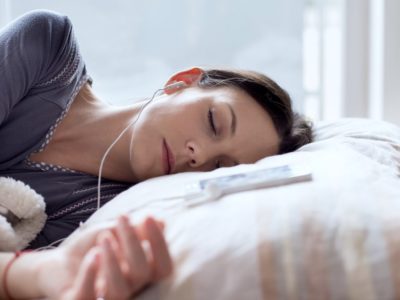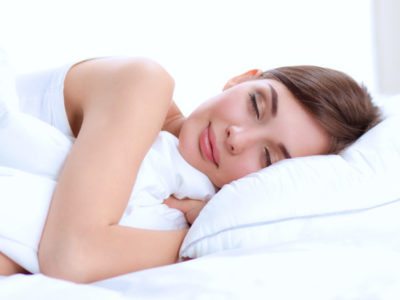It’s considered the hallmark of adulthood: “I’m so tired.”
Nap culture, staying-in-on-a-Friday culture, bragging-about-how-little-sleep-you-got culture is rampant in 2019. But have you ever thought about how your REM cycle affects your gut culture?
Science is beginning to wake up to the relationship between your gut microbiome and the quality and quantity of sleep you’re getting. If there is a gut-brain axis, and your gut health can affect anything from your ADHD condition to the eczema on your skin, why shouldn’t sleep factor into your overall digestive health?
It turns out that not only does sleep affect the health and flow of the flora in your gut, but the flora in your gut also affects the type of sleep that you get.
You see, your gut functions most optimally when the species of bacteria living in your microbiome is diverse and thriving. When that happens, you get better sleep. When you get better sleep, your microbiome flourishes.
In this post, we’ll break down the top issues that should alert you to deeper, rumbling trouble. Although lots of factors can influence your sleep (caffeine intake, stress levels, nutritional deficiencies, and more), scientists are realizing that all of those things affect, and are affected by, your gut as well.
Sleep Deprivation
As if worrying about being able to focus at work wasn’t enough, sleep deprivation can also negatively affect the balance of bacteria in your gut microbiome.
In fact, a study completed in 2016 found that beneficial bacteria count decreased after only two nights of not sleeping.
What that means is, you are more susceptible to diseases, viruses, indigestion, mood swings, and all kinds of other symptoms of imbalance when you’re not sleeping well.
This is because the microbiome is regulated by circadian rhythm. When these rhythms are interrupted, the microbiome suffers.
Sleep Apnea
Sleep apnea, a condition which is characterized by breathing stopping and starting during sleep, is a disaster to gut health.
The fact of the interruption has a negative effect on the dynamic species of bacteria in the gut. Specifically, a decrease in the Bacteroidetes and Proteobacteria phyla population.
Part of the reason for this is that the interrupted flow of oxygen disrupts the flow of your regeneration and causes the nightly healing process to stunt.
Now, because high blood pressure often exists concurrently with sleep apnea, new studies are showing that a stunted microbiome may also be linked with high blood pressure.
Meaning poor sleep, or fragmented sleep, can lead to higher blood pressure as well as a homogenous gut bacteria population.
Sleep and Stress
It’s well known that stress can manifest in physical ways — ulcers, nervous tics, higher blood pressure, etc.
And we’re aware that stress has a negative impact on sleep. It can be hard to sink into a regenerative sleep when your mind won’t stop reeling, your body is tense, and bad dreams plague you through the night.
It’s come to light recently, however, that stress can damage the good bacteria cultures in the gut, which then makes the body’s response to stress even more severe.
But studies are showing that a particularly beneficial bacteria, Lactobacillus casei strain Shirota, found naturally in the gut but also found in fermented foods, can help. People with healthy levels of this strain have an easier time falling asleep, get better deep-wave sleep, and feel more refreshed after sleeping.
Sleep and Depression
People with depression and people with insomnia both have distinct features in the makeup of their gut bacteria. It’s clear to psychiatrists and biologists alike that there is a connection between depression and sleep — whether it’s oversleeping or undersleeping.
Here’s where the gut comes in: the reigning theory among scientists is that a feature of depressive insomnia may be over-stimulated nerves caused by particular gut bacteria.
It’s not fool-proof yet, but it does make a lot of sense. Should a modification occur in the gut microbiome that causes nerves to be overactive, the brain would certainly respond in abnormal ways.
Sleep and Bowel Disorders
According to the International Foundation of Gastrointestinal Disorders, sleep is the number one complaint among people with chronic gut pain.
The assumption has always been that this is because it’s difficult to relax while you’re in pain. Obvious, right?
However, it’s been discovered that different kinds of bowel disorders produce different sleep hormone levels.
Inflammatory cells have also been associated with dysfunctional sleep. Although it’s unclear exactly why this is, it’s been shown in multiple studies that bowel disorders are negatively affected by poor sleep, and that poor sleep can be caused by irritated bowels.
The bottom line?
Science doesn’t have all the answers yet. But it is clear that everything from IBS to sleep apnea to good old-fashioned stress can affect the diversity of your microbiome bacteria culture.
And thus, affect the quality of your sleep.
Pro-tip: Instead of eating a meal or an unhealthy treat before bed, try eating a snack with simple ingredients, like a banana, or whole-wheat toast with nut butters, to sooth your gut before you catch some shut eye.
You May Also Like…




